
MTL, Israeli Army Jeep and soldier on a road in the West Bank, Palestine, July 2013. A mother of a martyr, at the wake of her son, said: “They killed him in the city center. They made a site for him today. Why were the Israelis there? They came into town to make arrests and throw tear gas on houses. The houses have children and pregnant women in them.”
This is the first in a series of dispatches from the occupied territories of Palestine, 20 years after the Oslo Accords. We have been on the ground for over two months, traveling from the occupied Golan Heights on the borders of Syria down to the Negev desert and the territory in between. International reports full of damning statistics about civilian casualties, imprisonment and poverty have piled up unread in the inboxes of the powerful. But for us, the situation in Palestine is not about statistics; life can never be reducible to numbers. We seek to broadcast the Palestinian voices that remain unheard, and to demonstrate the brutality inflicted on the human beings attempting to live here.
—
On July 30, 2013, Palestinian and Israeli representatives restarted peace talks, presided over by United States Secretary of State John Kerry. The negotiations resumed with a spectacular photo-op for the international media: an Iftar celebration at the White House, with Israelis and Palestinians breaking bread together in spite of seemingly intractable differences. Officials involved in the peace talks spoke words of cautious optimism, shared determination, tough compromises and good faith negotiations.
The people living through hell in Palestine know how hollow this charade will be. Their daily lives reflect an unrelenting attack on human life and dignity. They face serious water and food shortages. They lack basic resources and utilities. They cannot find good employment. Education is poor and unaffordable. The quality of their health care is beyond dismal. Here is one family’s experience: The mother hemorrhages at an Israeli roadblock on the way to Jerusalem for better care, and her young daughter diagnosed with kidney failure learns that dialysis treatment is only available at a governmental hospital that services 300,000 people because the Oslo Accords do not permit private Palestinian hospitals to have the requisite machines. The father has already died of pancreatic cancer after being misdiagnosed with pancreatitis. Such is life in the Palestinian territories. These conditions (PDF) make sustained survival impossible; in the short run, people turn to international aid to hang on and enter into debt as they piece together provisional livelihoods.
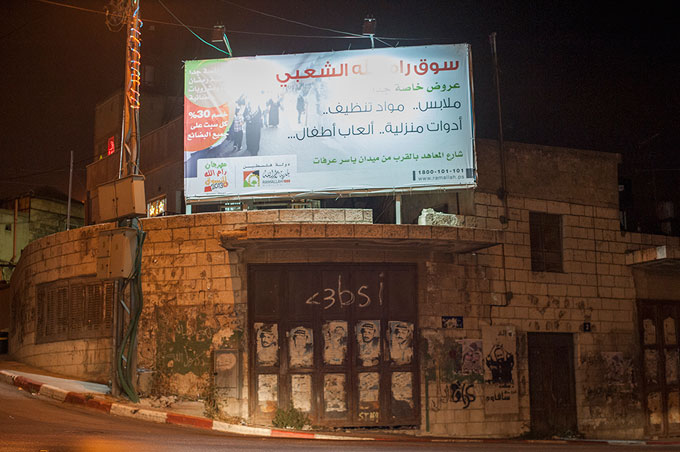
A closed shop in downtown Ramallah at night. Photo by MTL, July 2013. A martyr’s brother in Nablus, speaking at a coffee shop he runs, said: “It’s very slow. People get their salaries by the first of the month and they get over by the 15th of every month. So you take groceries for the rest of the month on debt. Everybody takes out a loan and buy groceries on debt.”
Meanwhile, illegal Israeli settlements abound, steadily swallowing the land. Precious olive groves and private property are destroyed. People are deprived not only of the use of their land, which would provide suitable living, but also their freedom to move through it. The Wall looms. IDs are confiscated. People are subject to military raids, arrest and imprisonment, which often leads to indefinite detention and solitary confinement. Many are killed, in their own neighborhoods, in scuffles at “checkpoints,” or later, in prison.
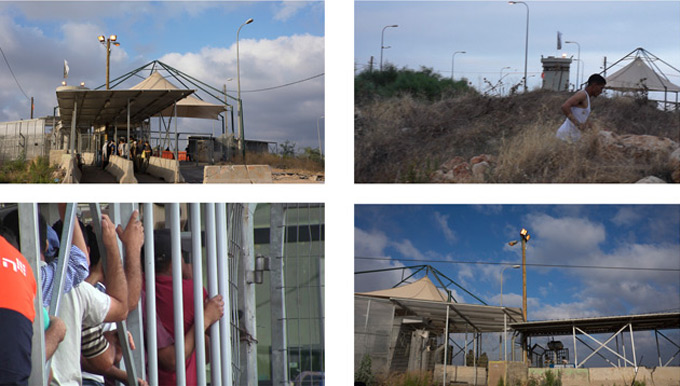
An Israeli checkpoint in the village of Azzun Atma. Palestinians can be seen waiting in line to enter Israel, and an “illegal” Palestinian worker is seen coming into Palestinian territories. Photos by MTL, July 2013. Mourad, a former political prisoner and a prison activist, said: “Now, we are talking about a new level of torture. Let’s say you are at a roadblock going to Jerusalem. What do you do? Everyday I go. I take my wedding ring off. I put it in my briefcase. I take my bracelet and my watch and I put it in my briefcase. And when I pass, I try not to let anything on me trigger the security alarm. I joke around sometimes. I say the person with high spirits beeps while crossing through the security machine. And if your morale is low you take everything out to make sure nothing rings. You do not want to disturb yourself or others.”
The Palestinian people’s own leaders are complicit in all of this, hoarding limited resources for themselves as they collaborate with Israel to protect and advance its interests. The PLO’s former chief negotiator sells cement to Israel so that it can build more settlements and portions of the Wall, even as he leads “peace” negotiations. According to cables revealed by WikiLeaks, Mahmoud Abbas received advance notice that Israel was going to undertake Operation Cast Lead, in December 2008, against his own people in the Gaza Strip. He remained silent. The people have no true representatives, despite the world’s assertion that they do.
The simple fact that people cannot survive in Palestine is the whole point. The carefully conceived misery of their existence is part of Israel’s longer-term project to drive Palestinians off their land. A woman in Bil’in gazing at the Wall from her window said to us, “Israel already has the land; it just wants the deed.” The only bewildering thing to the Israeli government is that the people are taking so long to depart. Israel no doubt hopes that another round of fruitless, humiliating negotiations will encourage some relocations.

An Israeli Jeep at a checkpoint and an Israeli settlement. Photos by MTL, July 2013. Abu Abed, a “legal” worker in one of the Israeli settlements, said: “I do not pass through the roadblock into Israel because I work in a settlement. I get a permit from the Israeli roadblock. We call it the ‘crossing.’ It’s an Israeli crossing. They do everything there. That’s where my permit is issued. There are permits to enter settlements and there are permits to enter Israel. So with my permit I am not allowed into Israel, only settlements. Even into Jerusalem I am not permitted.”
Palestinians see the renewal of peace talks as a sham media campaign targeting the outside world, designed to demonstrate that the Israeli government is reasonable and wants peace. Palestinians have come to understand that most of the outside world does not care enough to investigate the true conditions in Palestine, and that Israel will take full advantage of this ignorance with false gestures.
One can see this insincerity in Israel’s seemingly significant promise to release 104 Palestinian prisoners. Most of these prisoners were supposed to be freed 20 years ago following the Oslo Accords, and there is still no guarantee of their release. Israel has agreed to let these prisoners go in four installments, but even this is subject to its unilateral determination that the Palestinians are continuing to negotiate in good faith. When Abbas hinted that Palestinians may not attend the first round of talks in response to Israel’s approval of 900 new housing units in East Jerusalem and its plans for more than 3,000 new settlement homes across occupied Palestinian territory, Israel threatened to halt the release of the first 26 prisoners. Though Israel has now freed these prisoners, the act remains disingenuous: five of the 26 prisoners had only a few months left to serve. In any event, it is unlikely that Israel will refrain from arresting more Palestinians during negotiations; in the past, when Israel has released prisoners, it has simultaneously arrested an equal number to placate Israeli public opinion. Even now, arrests occur daily for little or no reason. The Israeli army recently detained a 5-year-old boy, an act its legal adviser deemed “legitimate.”
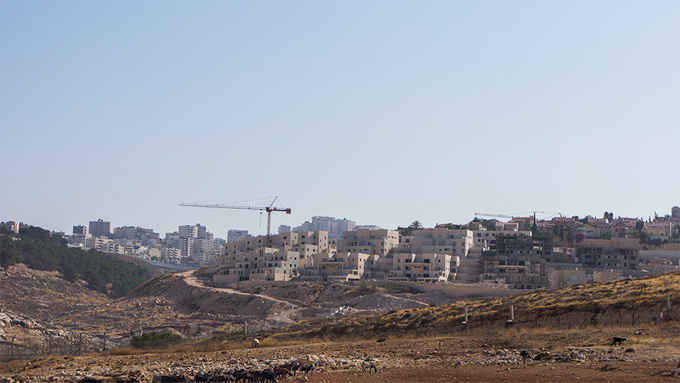
The expansion of an Israeli settlement on Palestinian land. Photo by MTL, August 2013.
Abed and Shurook on a hilltop looking out at the Arab village of Azzun:
S: What’s that?
A: A settlement.
S: And what’s that?
A: A settlement.
[pause]
A: The settlements are more than the Arab towns.
The matter of imprisonment resonates deeply for Palestinians, where almost every Palestinian home has some connection to past and present prisoners. Since it occupied Palestinian territories in 1967, Israel has arrested more than 750,000 Palestinians, including tens of thousands of children. Forty percent of the male Palestinian population has endured time in prison. Freedom for loved ones is a cherished dream.
It was once conceivable that peace talks could have produced a humane result. That is what Oslo represented. But once Yitzhak Rabin was assassinated and Benjamin Netanyahu repudiated the Oslo Accords, a different path was chosen. Under today’s approach, Palestinians will be methodically squeezed out until all the land claimed by Israel is within its borders. When the second Palestinian Uprising broke out in 2000, Israeli tanks made their way through neighborhoods and refugee camps, leaving homes in rubble. Israeli snipers positioned themselves on rooftops and picked off Palestinians. Following the election of Hamas, the Israeli government imposed a devastating land, air and sea blockade on the Gaza Strip. Then, in its 2008–2009 war on Gaza, Israel defied international law and opinion by using F-16 jets to bomb one of the most densely populated areas in the world. These actions, among others, have produced unbearable living conditions that persist until this day.
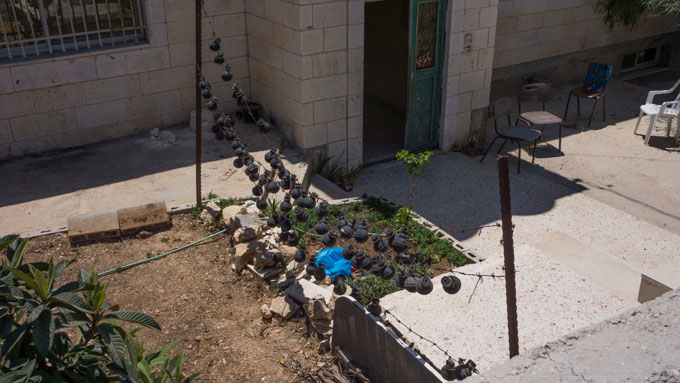
A house in Nabi Saleh, a small village twenty kilometers northwest of Ramallah. After prayer on Fridays, people protest the Israeli occupation, and in particular, the usurpation of the village’s natural water spring by the Halamish settlement. Every Friday without fail they encounter tear gas, rubber bullets and sound grenades. Many people from the village are arrested, together with international solidarity activists. During the clashes, the Israeli army targets the water tanks on top of the houses with skunk water as a form of collective punishment. The village receives water once a week from Israel, whereas the settlement gets 24/7 access to water. The canisters in the above image are souvenirs from these protests, decorating the entrance of a house in this village and reminding people of resistance. Photo by MTL, 2013.
Secretary of State John Kerry said in May, almost comically, “We are reaching the time where leaders need to make hard decisions.” In fact, we are decades past that time, and those decisions have long ago been made. Israel will use any means necessary to claim land they see as theirs by right of heaven, regardless of the brutality required. A key adviser to Netanyahu openly says, “Evacuating settlements is a fantasy.” Meanwhile, the Palestinian Authority has demonstrated that it will sell out its people and line its pockets. The peace talks will further both of their objectives, whether or not they are declared a success.
Palestinians today will not achieve any net gain from the negotiations. That is not the point of the process. Any concessions granted will cost more in return. The logic of Israeli land grabbing trumps all other concerns, including human rights and international law. If one analyzes events from this perspective, nothing should be confusing. Anyone who remains behind to defy this process will be locked up, killed or relocated, by Israel or the Palestinian Authority, or both. This is the same logic of settler colonialism that has led to numerous wars and genocides, including the massacre of the native North American population. When two populations are so unevenly matched in arms and resources, the result is inevitable. Why fool ourselves by pretending otherwise?
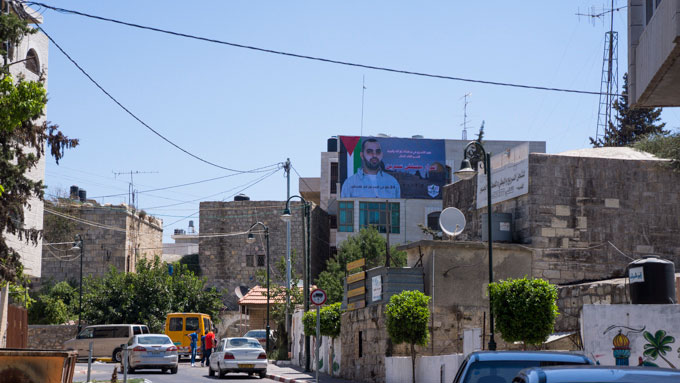
A billboard of a current Palestinian political prisoner in the town of Al-Bireh. Photo by MTL, August 2013. Sa’eda, the spouse of political prisoner Abdulla Al-Barghouthi, said: “The release of the 104 is an accomplishment. Anything that we do that involves, and especially when it includes the prisoners, is an accomplishment for us. But… of course, until when… They say “old prisoners”. But what is old? Is 10, 20 years not old enough? Until when? We are going to keep on negotiating for another 30 years about the prisoners that they say are new?”
Given the above, some will question the point of the Palestinians’ continued struggle, or whether they can change anything. These are two distinct questions. The point of a struggle is the business of those engaged in it; it is not up to outsiders to judge the worthiness of a struggle born of necessity. We see the Palestinians take action every day: they continue to resist with stories, rocks, demonstrations, sit-ins, boycotts and hunger strikes. They are fighting. Still, there is a widespread sense that their enormous efforts do not mean that outcomes will be very different. Whether people can change things depends upon what exactly they try to change. People are trying to make their lives marginally better by engaging in grassroots efforts to improve basic conditions and to resist the occupation, almost in spite of the ineffectual Palestinian Authority and PLO. In any event, many Palestinians are slowly realizing that the present methods, centered on trying to stop Israel’s methodical consumption of the land, aren’t going to work. What do you do instead, if you don’t want to die on the land? The answer is not yet clear.
As a former political prisoner put it to us, “I see the future to be headed for the worse: the settlements expand, the barbed wire takes root… A year ago was better than today, and tomorrow will be worse than today.” So, today, we do not write with hopeful signs of progress. Those are the fantasies peddled by leaders and the negotiators. We write to record what the people in Palestine endure as they are tortured and intimidated, despite the assurances of international law and the demands of human dignity—to bear witness, once more, to what has happened to these people and their culture.

